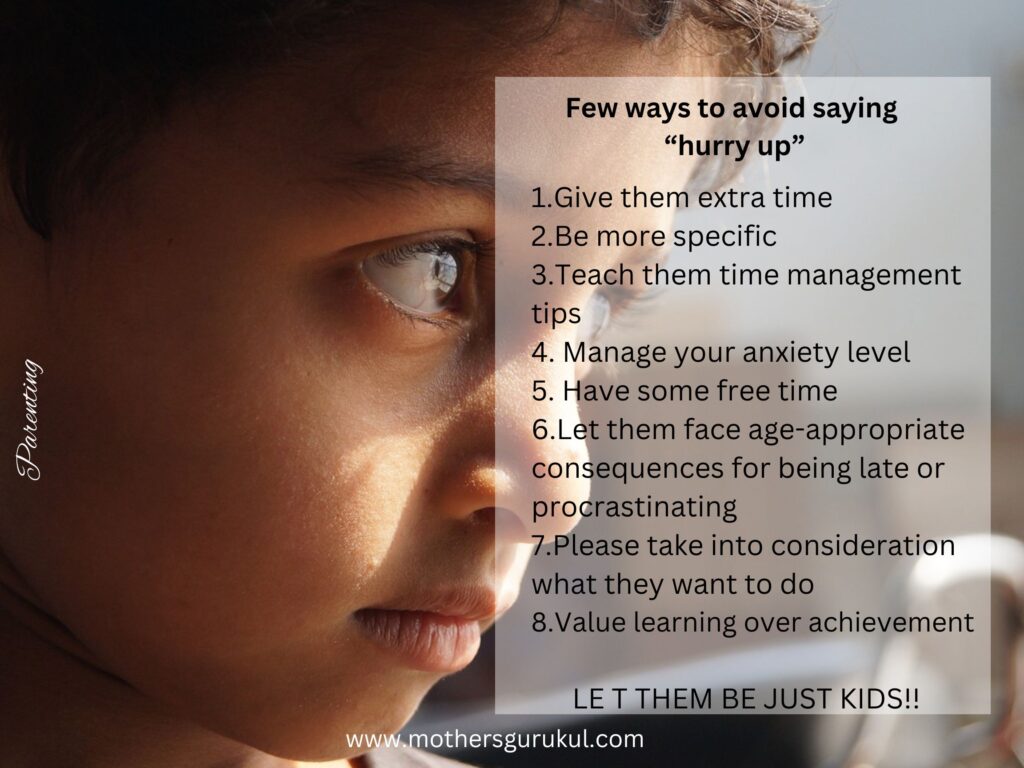A few days ago, I came across a term – Hurried child syndrome. Have you heard about it? Psychologist Dr. David Elkind first discussed this term in his book The Hurried Child. According to Dr. Elkind, hurried child syndrome is when a child is pushed to grow up “too fast,” such as when a child is over-scheduled with extracurricular activities, pressured to achieve, or expected to act older than they are. However, mental health professionals do not use hurried child syndrome as an official diagnosis. It is considered a more theoretical concept.
Every now and then, we come across kids whose week is packed with extracurricular activities, when we talk to them, it feels like we are talking to a mini adult, or who are always thinking about their performance? Don’t get me wrong when I ask you this. I have no intention of judging kids and their behavior. What I am trying to tell you is, from the outside, they seem like the perfect combination of qualities a parent might desire in their child i.e. an outstanding academic record, mature behavior, and a multi-talent personality. But sometimes kids may be anxious which parents are not realizing. Have you thought about it?
As parents, we have a list of words or phrases we should and shouldn’t use. Good job, well done, bravo, you can do it, give your best are a few from the list. Along with this, there is one more word that parents use all the time – “Hurry up.” Do you agree? I feel “hurry up” is more of a command than just two words.

What’s wrong in saying hurry up?
Shouldn’t parents tell their kids to hurry up? Does it contribute to their stress and anxiety? Well, there is no foolproof evidence that states that saying “hurry up” can cause anxiety. It is because anxiety is not caused due to one single factor. But when parents rush kids for every single thing and it happens regularly, it does put some amount of pressure on them. Also, since their brain is always on the go to finish their task list, it leaves limited to no scope for them to think on their own.
Related article: Step Ladder Approach
Most parents have the very best of intentions. It seems natural to want more for their children than they had themselves. But while kids are busy finishing their task list, are they thinking on their own or just following the commands of the parents? Are they getting time to relax and BE KIDS?
How do we know if the child is experiencing hurried child syndrome?
-Disruptive sleep pattern, poor eating habits, no physical activity: Because their routine is tied up.
-Feeling themselves less worthy and relating progress with achievement: Because they are constantly trying to prove themselves.
-Week emotional development: Because their mind is always busy with something or other.
-Frustration between parent and child: Because their body and mind are tired, it comes out negatively.
-Finding it hard to relax: They hardly experience it.

Saying “hurry up” to your child – is it good or bad?
As I said, it is not proven that saying “hurry up” can cause anxiety, but if we want to see it from an angle of reducing stress for both the parent and the child, then here are a few ways to avoid saying it:
Give them extra time:
Even grown-ups need time to transition from one activity to another. Then why do we expect that kids should transition at jet speed? Giving them a heads-up 5-10 minutes before the actual time will make the transition smooth, and they will not feel rushed.
Be more specific:
Just saying “hurry up” does not provide them with information about what they are expected to do. Although it may seem obvious to us as adults, it is not to kids. For example, instead of “hurry up,” you could say “finish your shower”, or “get dressed up”, “pack your bag”, or “put your shoes on and wait for me in the car”.
Teach them time management tips:
Teaching them time management tips from an early age helps them to feel less overwhelmed. They can use an alarm clock for their tasks. Even when taking a break, setting a timer can help keep the break within control.
Manage your anxiety level:
Have you realized that when we panic, we also spread those vibes in our surroundings? Even though small tasks seem tedious, we make more mistakes and get frustrated for no reason. So, to maintain a calm environment, first, we have to manage our anxiety level. If you are hurried, then you will be agitated, so do some retrospection.
Have some free time:
Every day, there should be some dedicated time when a parent can sit, relax, and share the giggles with their kids. This downtime is significant for family bonding and a kid’s brain development.
Let them face age-appropriate consequences for being late or procrastinating:
Sometimes, kids must bear the consequences of their actions. Parents who want their kids to be independent must let them take responsibility. For example, instead of constantly reminding them to finish their homework or getting ready for a class, let them face what happens if they don’t do it in time. Tell their teacher why they couldn’t finish their homework or were late for the class. If possible, let the teacher know about it in advance.
Please take into consideration what they want to do:
Be selective while deciding on activities for them. Instead of enrolling them in 5 different classes, of which only 1 or 2 are of interest, it is better to use that time to strengthen your interpersonal relationships.
Related article: Deciding on extra-curricular activities for our kids
Value learning over achievement:
When they sit for an assessment, ask them to tell you about everything they learned that wasn’t on the test.
Wrap Up!!
Smartphones and social media have already exposed children to the adult world; now, let’s try to let them enjoy being just kids. Let’s not rush our kids unnecessarily.
